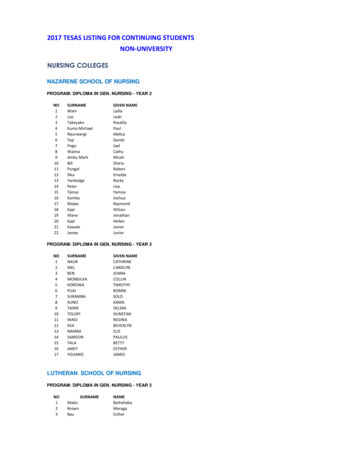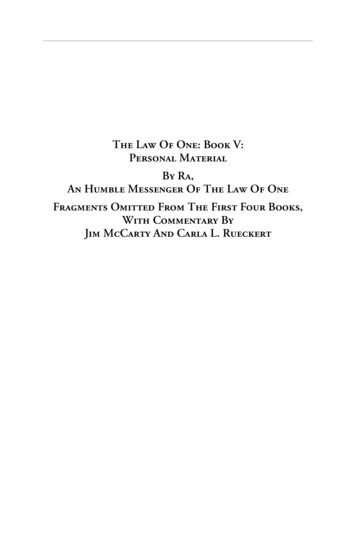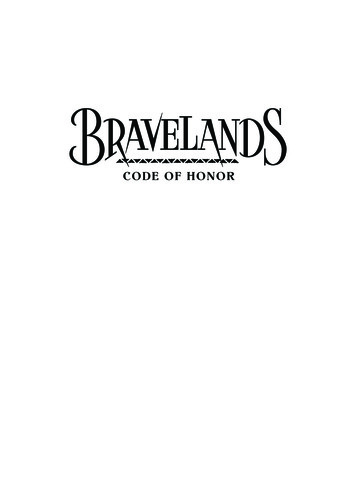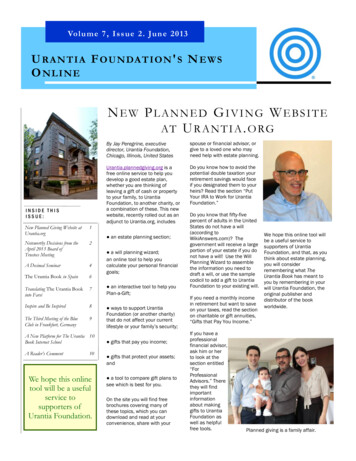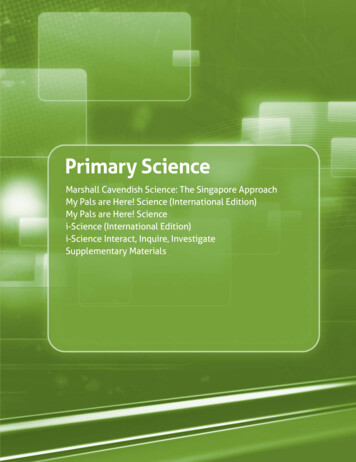
Transcription
The Book of Micahfrom the bookMinor Prophets: Major Messagesby Rev. George McCurdy
ContentsHow To Use This Study Guide. 5Introduction. 6What is said about Micah’s name and lineage?.7What was his timetable in reference to other prophets and kings?.8What are some of the more familiar and loved passages in The Book of Micah?. .8What specific themes and passages challenge us to apply our hearts untowisdom so that we can build up the walls of the Lord’s new church?.9Chapter One. 11Micah 1:1-2. 11Micah 1:3-7. 15Micah 1:8-12. 25Micah 1:13-15. 31Micah 1:16. 37Chapter Two. 41Micah 2:1-2. 41Micah 2:3-5. 44Micah 2:8-9. 55Micah 2:10-11. 59Micah 2:12-13. 62Chapter Three. 67Micah 3:1-3. 67Micah 3:4. 722
Micah 3:5-7. 75Micah 3:8. 81Micah 3:9-11. 84Micah 3:12. 88Chapter Four. 93Micah 4:1-2. 93Micah 4:5-10. 102Micah 4:11-13. 108Chapter Five. 114Micah 5:1. 114Micah 5:2. 116Micah 5:3-4. 121Micah 5:7. 130Micah 5:8. 133Micah 5:9. 136Micah 5:10-15. 138Chapter Six. 146Micah 6:1-4. 146Micah 6:5. 152Micah 6:6-8. 155Micah 6:9-11. 160Micah 6:12-13. 164Micah 6:14-16. 1673
Chapter Seven. 173Micah 7:1-4. 173Micah 7:5-6. 181Micah 7:7-9. 187Micah 7:10. 191Micah 7:11-12. 194Micah 7:13. 199Micah 7:14-15. 201Micah 7:16-17. 207Micah 7:18-20. 211Epilogue: A Summary of the Book of Micah. 217Chapter One. 217Chapter Two. 217Chapter Three. 217Chapter Four. 218Chapter Five. 218Chapter Six. 218Chapter Seven. 2184
How To Use This Study Guide1. A slow, unhurried reading of Micah is essential. Reading the chapter beforelooking at the notes, while working with the notes, and after finishing with thenotes will give each researcher a powerful sense of the series of meanings withineach chapter. It is important to be comfortable with all the names and places inthe prophecy and to understand the announcements the prophet makes onbehalf of the Lord. When possible, historical information will be included in thenotes to increase reading comprehension and enhance application.2. Our study of each chapter of Micah will begin with quotes from a work of theWritings called Summary Exposition of the Prophets and Psalms. This workincludes a verse-by-verse overview of all seven chapters of Micah that providesgeneral information about the internal sense. Our research will help move usfrom the generals to the particulars of the internal sense.3. Another important reference tool is Searle’s General Index to Swedenborg’sScripture Quotations. This reference is used to find passages in the Writingswhere a verse(s) from the Word is either explained specifically or used toillustrate a doctrinal point that we can use in our study. There is also another useof this work. As we study, each researcher will be led by the Lord’s Providence inmyriad ways, according to specific needs or states. Knowing how to use this bookwill help each of us to explore relevant topics and look up related passages toincrease our knowledge of the three-fold Word.4. You will soon discover that not every verse, word, name, etc. is directly quoted inthe Writings. But there are often other references to the same name, place, orthing in the explanation of a different verse of the Word. The hope is thatreflection on these other doctrinal explanations will help us see possibleapplications to our study of Micah. We will need to use “derived doctrine” often.Please don’t run away from this maligned term. If we use it properly and admitopenly that it is derived doctrine, we bring no harm to the internal sense.5. Keep some kind of notebook handy during your study times. Write out insights,questions, and any summaries you find helpful in organizing your thoughts abouteach chapter. The goal of this study guide is not to give a detailed summaryof the internal sense but to start each researcher’s quest for deeper insight.6. At the end of each chapter in the study guide, you will find a study review. Thereview includes a summary of each section to help you reinforce and build onyour understanding of several of the key points.7. Begin each study unit with a devotional prayer asking the Lord to guide anddirect your thoughts. Certainly, beginning in this sphere has the power to inspireand open our minds with a higher spiritual priority that will keep us in thecompany of the Lord’s angels. As the Writings teach, we must seek to love truthfor truth’s sake. Such an approach will free each reader from preconceived ideasthat might limit his or her ability to “see” the intent and message of the Lord’sWord.5
IntroductionWelcome to a rich, challenging, and wonderful study of The Book of Micah—one ofthe books of the Lord’s Word. This book makes clear from its opening verse to itsclosing verse that everything that is shared in this prophecy is from the Lord alone.“The word of the Lord came to Micah ” The Lord indeed came to Micah. Micahdid not have a retreat time to study, meditate, or write out insights he had whilethinking about the Lord. He was not part of a special group called “the sons of theprophets.” The seven chapters are not about Micah, nor are they personal wordsarising from Micah’s deep concern about or sorrowful reflections on current orpending national events. Micah was a faithful servant who listened carefully to theLord and then reported, without editing or altering, what was revealed to him. Hedid not sanitize the revelation for political correctness. The Lord called Micah tospeak to the church about the serious decline of its spiritual health and to tell thechurch what was going to happen to it. Micah faithfully repeated the Lord’sdeclaration that the Jewish church was spiritually coming to an end. He had to tellthe people that the Lord was going to make His advent so as to form a new churchout of many people and other nations. Did the people of Israel want to hear thesewords? Would they be inclined to warmly embrace Micah for this message? As far asthe Jewish church was concerned, this message was “nonsense.” They were theLord’s favored people. Nothing—nothing!—could or would remove them from thatspecial status. What Micah told them must have been a hard lesson and irritating forthem to hear. Micah did not argue with the Lord, nor did he try to put “a positivespin” on the Lord’s words.We would do well at the onset of this study to dedicate ourselves to a “Micahian”approach to the spiritual message of the Lord. Otherwise, we will be drawn into aseries of natural, historical suppositions that could mislead and distract us. Youmight not have the time and academic resources to check out what biblical scholarsdo in this area, but believe me, they are sometimes “over the top” with theirspeculations and assumptions. Here are some examples: the dates of Micah’s life areuncertain, and some question whether Micah lived long enough to write the wholebook, hypothesizing that some his followers finished his work for him; somescholars try to tie precise applications of “Micah’s words” to a particular king,perhaps an imposing neighboring king; others attempt personal speculations onwhat it must have been like when Micah visited Jerusalem, coming from hishometown in the farmland into the big, sophisticated city. In one section of Micah,scholars are amazed and amused with Micah’s “puns.” (See Micah 1:10-15.) Theypoint to his “play on words.” Really, is that something the “Word of the Lord” wouldallow Micah to employ? Puns? Plays on words? There are many other examples ofscholarly speculation that could be cited, but perhaps these will suffice for the timebeing.The New Church teaches us that it is a sound spiritual principle of exposition to stayaway from a preoccupation with the person and instead to focus wholly on thesubstance of the Divine revelation. As interested as we might be in Micah, his6
lineage, his timetable in relation to other prophets, the kings ruling at the time of hisprophecy, or what enemies were waiting to invade and conquer, these things areonly secondarily important in relation to the correspondential representation andmeaning of the spiritual sense, from the Lord, to eternity. The Lord’s truth is notconfined by time or space. His Word is infinite and eternal. We need to know aboutMicah to the extent that he was a faithful “scribe.” He did obey, honor, and respectthe truth of the Lord. We, too, need to be faithful scribes and adhere honestly to HisWord. Will we avoid playing thematically popularizing games with the Word? TheLord will come to us when we are in a receptive state, willing to listen and obey. Theall-pervading question is this: Do we want to learn the lessons in The Book of Micahto prepare and school us in the spiritual process of becoming a member of the Lord’snew church? Are we willing to lay aside a “dead church” to take up a living churchwith the Lord at the center? If so, we want to go to the core of scriptural meaningand context and not to imaginative scholastically driven forms of speculation.Having offered a cautionary note on scriptural study and application, let’s look, withspiritual “balance,” at some of the facts we are given in the Word about Micah. Ourinquiry will strive to address the following questions:1.2.3.4.What is said about Micah’s name and lineage?What was his timetable in reference to other prophets and kings?What are some of the more familiar and loved passages in The Book of Micah?What specific themes and passages challenge us to apply our hearts untowisdom so that we can build up the walls of the Lord’s new church?WHAT IS SAID ABOUT MICAH’S NAME AND LINEAGE?The name “Micah” means “Who is like the Lord?” Indeed, we must have awe and lovefor the Lord as our highest end. All other gods must fall down and leave His holypresence.The Word informs us that Micah came from a town called Moresheth. Scholars arenot sure where that town was, but they believe that it was about 25 miles southwestof Jerusalem. That area is a productive agricultural area. Therefore, it is assumedthat Micah, and his family, were “farmers” of simple heritage: no royalty, noprestigious pedigree, just farmers with a feeling of closeness to one another andnature.Nothing more is known of his family. Did he have brothers or sisters? Did his familyexperience a “rustic” rural life on a farm? Let us state it again: Nothing is knownabout Micah except for his name, his hometown, and the kings ruling during hislifetime. Is his personal information omitted by Divine design? Is the impliedmessage that we should focus not on the person but on the spiritual truth we areabout to hear?7
WHAT WAS HIS TIMETABLE IN REFERENCE TO OTHER PROPHETS ANDKINGS?Scholars state that Micah was “a contemporary of Isaiah and Amos and Hosea. Somehave even speculated that Micah might have been a student of the prophetIsaiah ”(Al Maxey, “The Minor m) The basis for this theory is a perceivedsimilarity between certain passages of The Book of Isaiah and The Book of Micah.Why does Isaiah come off as the senior teaching prophet? (Note Micah 4:1-3 andIsaiah 2:1-3 for the similarity of messages.)A check for similarities between Micah and other prophets provides an interestingstudy. Micah and Isaiah have fifteen or more passages with similar wording, Micahand Jeremiah about six. Micah is cited in Matthew 2:5-6; Matthew 10:35-36; John 7:6,42; and Luke 1:72-73. Why mention this? The Word of the Lord comes to eachprophet. There is no prophetical ownership of revelation. There are no schools orstudents who “said it first.” When it comes to the Word being written, the rule issimple: the Lord said it first. The Lord shared His insights and truths with Hisprophets. They did not make up the truths as teachers or preachers. They all heard itfrom the one inner source of truth—the Lord.Concerning the kings mentioned in the passages of Micah, we are taught that Micahprophesied during the reigns of Jotham, Ahaz, and Hezekiah. Jotham is thought tohave reigned from 739-734 BC, Ahaz 734-728 BC, and Hezekiah 716-687 BC. Jothamand Hezekiah were “good kings,” but Ahaz was a bad king. Some scholars say thatthe time of their three reigns combined totals 61 years. I don’t follow their math, butI offer it as an example of what happens when speculations become involved inreckoning physical historical facts.If these three kings reigned a total of 61 years, how old was Micah when he began towrite the words of the Lord? Was he led by the Lord from the beginning of Jotham’sreign, and did he complete his work for the Lord near the end of Hezekiah’s reign?Would it be more of a help, spiritually, if we were to reflect on the spiritualsignificance of the number of kings (three) and the spiritual meaning of the word“king” and the uses of kings? This certainly could come in handy when we recall thattwo kings were good and one was bad. What makes for a good king, and what madethe one, Ahaz, significantly bad? Is it of spiritual significance that Ahaz reignedbetween two good kings?WHAT ARE SOME OF THE MORE FAMILIAR AND LOVED PASSAGES IN THEBOOK OF MICAH?Here are a few. I hope you will add your favorites to this list:Micah 4:1-5 “They shall beat their swords into plowshares and their spears intopruning hooks they shall no longer learn war.”8
Micah 5:2-5 “But you, Bethlehem Ephrathah, though you are little among thethousands of Judah, yet out of you shall come forth to Me the One to be ruler inIsrael, whose goings forth are from of old, for everlasting for now He shall be greatto the ends of the earth; and this One shall be peace.”Micah 6:6-8 “With what shall I come before the Lord, and bow myself before the HighGod? Shall I come before Him with burnt offerings, with calves a year old? Will theLord be pleased with thousands of rams, with ten thousand rivers of oil.He hasshown you, O man, what is good; and what does the Lord require of you but to dojustly, to love mercy, and to walk humbly with your God?”Micah 7:7 “Therefore I will look to the Lord. I will wait for the God of my salvation;my God will hear me.”Micah 7:18-19 “Who is a God like You, pardoning iniquity and passing over thetransgression of the remnant of His heritage He will again have compassion on usand will subdue our iniquities.”WHAT SPECIFIC THEMES AND PASSAGES CHALLENGE US TO APPLY OURHEARTS UNTO WISDOM SO THAT WE CAN BUILD UP THE WALLS OF THELORD’S NEW CHURCH?There are so many passages one could cite, powerful passages that warn us whatwill happen when priests and rulers misuse their offices. The Lord warns against theerror of favoring self-intelligence. Pride, arrogance, and self-directedness will causethe church within to die. External ritual may go on, and the vestiges may be ornate,the rituals carried out in meticulous detail, but if the heart is not humble before theLord, it is all for naught. If the shepherd is not vigilant and protective of the flock,they will be plundered by predators that stealthily lie in wait to attack in avulnerable moment. Israel allowed the worship of other gods to enter into the Lord’stemple. Unbelievable atrocities were being committed against the Lord’s truth.Micah told the people the Lord called them “harlots.” They were receiving “the pay ofa harlot.”(Micah 1:7) Things got so bad spiritually in the church that they had “noone to determine boundaries ” (Micah 2:5) “You have taken away My gloryforever.”(Micah 2:9) Israel’s prophets were chanting “peace” while chewing away atthe flesh of the people. Therefore, they were in a night state “without vision.” (Micah3:6) The church was no longer offering fairness, justice, or truth. The Lord lamentedthat there was not a single person among them who cared for honesty and integrity.They had “wicked scales with the bag of deceitful weights ” (Micah 6:11)As the narrative of this sad calamity unfolds, the Lord’s report in Chapter 7 causesthe glorious sun of heaven to break through the clouds of remorse. The Lord,through the prayerful petition of Micah, tells everyone of His planned correctiveaction. “In the day when your walls are to be built shepherd your people withYour staff as in days of old.” (Micah 7:14, emphasis added.)9
Are you moved to pray Micah’s prayer for our own church? Lord, build Thou theinner walls of Your New Church solidly. Please make our walls large, substantial, andsecure so as to keep out the wiles of the hells. As Your sheep, we invite You to guideus with Your staff. In asking this, we will remember that a staff is used to guide, it isused to protect, and it is used to prod us along when we wish wrongfully to tarry.“As in the days of old” is a wonderful part of Micah’s prayer. The Writings teach usthat it is a petition to become like the Most Ancient Church. What does that mean? Itmeans to become innocent, to trust completely in the Lord for all of ourbenefactions, and most importantly to return to seeing the Lord as a Divine Human.Having the Lord walking among us, talking to us, counseling, and “touching” us is agoal worth pursuing. One of the passages in the Word that still moves me as it did inthe days of my youth is the story of the Lord taking the children up in His arms—touching them, kissing them, and blessing them. How I wished I could have been oneof those children.The Lord’s earthly ministry involved many forms of “touching.” He touched thewidow’s dead son, and he arose from his funeral bier. He touched Jairus’ daughter,and she awoke from her death sleep. When Peter began to slip below the ragingwaves, He reached out His hand and immediately brought Peter to the surface again.The blind recovered their eyesight because He touched them. What about the lame,the deaf, the palsied, the lepers, and the maimed? They were restored because “Hetouched them.” Is it any wonder that Micah’s prayer was to recover the ways of theMost Ancient Church? It was a prayer for the Divine Human to touch lives inrestorative ways.I hope you read well the story of Micah. Don’t let the hells discourage you with theirintimations that it dwells too much on gloom and doom. Instead, work through theprophecy with the knowledge that the Lord will come to the church’s rescue. He willbuild our walls sturdily. The enemy will not be able to plunder and intimidate thosewithin the walls of His new church. He wants us to leave behind the “dead” church.He invites us to come into a living, vibrant, and bright church that deals in fairnesswith honest scales. It is a church that knows its boundaries and will not play or getthe pay of a harlot.The Lord, in Micah 7:2, observed that “ the faithful man has perished from theearth, and there is no one upright among men.” Isaiah, when he heard the call fromthe Lord, said, “Here am I; send me.” Micah, too, heard the call. He went forth to tellthe church the “straight” news. Did they listen? There is no way of answering thatquestion except to say that the Lord always preserves a remnant to work with whenHe builds again. The best we can do is to make sure we ready ourselves so we cansay afresh: “Here am I; send me.”10
Chapter OneMICAH 1:1-2“The word of the Lord that came to Micah of Moresheth in the days of Jotham, Ahaz,and Hezekiah, kings of Judah, which he saw concerning Samaria and Jerusalem. Hear,all you peoples! Listen, O earth, and all that is in it! Let the Lord God be a witnessagainst you, the Lord from His holy temple.”Passages from the WritingsSummary Exposition of the Prophets and Psalms (P&P) “The descent of the Lord from heaven, and His coming into the world.”Arcana Coelestia (AC) 2921 [3] “ the name ‘Lord Jehovih’ is used especially when the aid of omnipotence issought and implored that such aid is sought, may be seen in Micah 1:2 and frequently elsewhere.”Derived Doctrine“The word of the Lord that came to Micah of Moresheth ” This superscription puts before us the true beginning, or origin, of thisprophecy. We are told that the word of the Lord “came” to Micah. Thus, theprophecy we are about to study is from the Lord’s revelation and is not theresult of Micah’s keen discernment or judgment, nor from any disciplinedprocess of meditative reflection. The “word of the Lord” came to Micah.AC 426 explains that the “‘word of the Lord’ is spiritual and not verbal.”AC 2015 teaches that the “‘word of the Lord’ must be in the glory of heavenand none of [it in] the world’s glory.”The name “Micah” means “who is like the Lord?” This is a name clearlydesignated to inspire praise of the Lord above all other kings, prophets, idols,or gods.The exact location of Micah’s hometown, Moresheth, is uncertain. Speculationputs Moresheth some 25 miles southwest of Jerusalem, 1200 feet above sealevel, overlooking the coastal plain. “The city was ringed by a circle offortifications built first by King Rehoboam, the son of Solomon and designedto protect Judah from attacks by the Philistines and major powers thusMicah was probably not from a simple peasant background but was familiar11
with the civil officialdom and military authorities ” (New InternationalBiblical Commentary: Minor Prophets I, by Elizabeth Achtemeier, page 292)“ in the days of Jotham, Ahaz, and Hezekiah, kings of Judah ” Jotham reigned from 742-735 BC, Ahaz 735-715, and Hezekiah 715- 687.This indicates that Micah’s preparation and delivery of this prophecy mayhave spanned some 55 years.What were the legacies of these three kings? Jotham was an ableadministrator. He subdued the Ammonites and built the upper gate of theTemple. Ahaz preferred playing international politics. Instead of heeding theLord’s advice, he scorned a sign from the Lord. Ahaz sought to buy the favorof other kings. He dabbled in idolatrous cults and weakened his countrymorally and financially. Hezekiah brought about reform. He ended theworship of pagan gods. He stood fast against the Assyrians. With the help ofthe Lord, a plague came upon the Assyrians and subdued them. Hezekiahbuilt a tunnel through rocks to bring water to the people during the siege ofthe Assyrians. His reign constituted a “peak” in the history of the kings ofJudah.“ which he saw concerning Samaria and Jerusalem.” Why does the Word specifically mention these two cities in the prophecy ofMicah? They were capital cities. Samaria was the capital of the Northernkingdom and Jerusalem the capital of the Southern kingdom. Together, theywere centers that influenced the whole nation. The Lord gave Micah amessage to help the church focus on the quality of leadership coming out ofthese important centers.Apocalypse Ex
The goal of this study guide is not to give a detailed summary of the internal sense but to start each researcher’s quest for deeper insight. 6. At the end of each chapter in the study guide, you will find a study review. The review includes a summary of each section to help you reinforce



